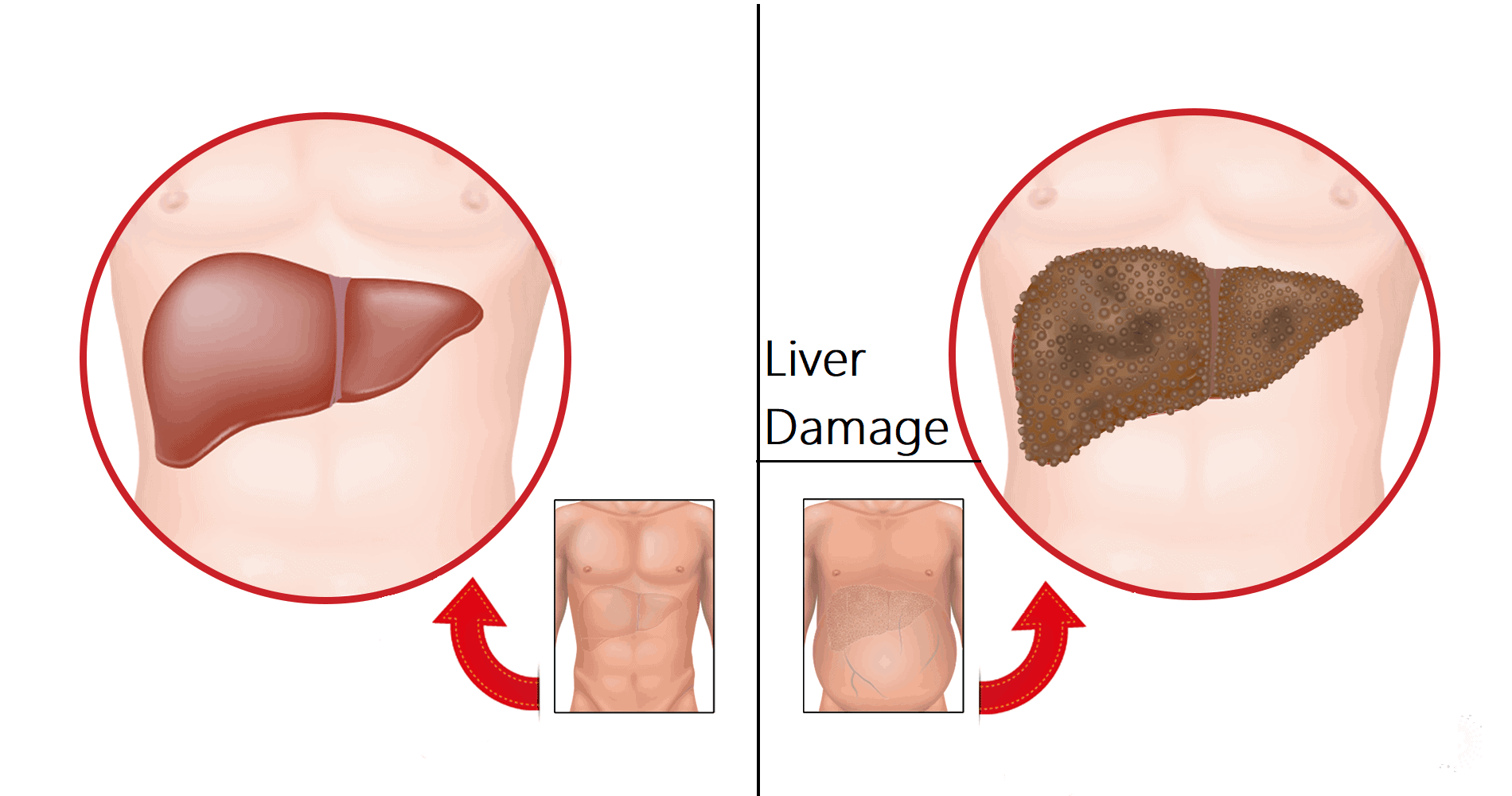A properly functioning liver is vital to our health. Without it, you won’t feel well, and your health will severely suffer. If you recognize the signs of liver damage in yourself or someone you love, you must find a way to reverse the effects.
There are many potential causes of liver damage, including genetic predisposition, long-term liver diseases, and prolonged exposure to toxic substances. While you can’t prevent genetics, you can reduce the number of toxins you take into your body.
You must understand the potential signs of damage to preserve your health and well-being. Liver disease rates are steadily increasing and have become one of the most common causes of death. Understanding why your liver is so essential. So what can you do to keep it healthy can make all the difference in your life?
Why a Healthy Liver is Essential
Your liver cleanses the body by metabolizing alcohol and drugs and neutralizing poisonous substances. It also manufactures essential body proteins, including those preventing blood-clotting, open pathways for nutrient delivery to the blood, and proteins that ward off infection.
Additionally, your liver produces cholesterol, converting it into essential substances used by the body. This organ regulates energy supply by manufacturing, storing, and delivering glucose to the body and brain. Plus, it helps balance hormones, including those found in the adrenal and thyroid glands.
Seven Possible Signs of Liver Damage

Watch for these red flags.
1. Fatigue
Research shows that chronic fatigue and exhaustion are the most common symptoms of liver damage. Medical professionals speculate that liver-related fatigue and exhaustion occur because of neurochemical changes in the brain and hormonal imbalances.
Exacerbating the feelings of fatigue and exhaustion are elevated levels of toxic byproducts in the blood, which an impaired liver cannot properly eliminate.
2. Dry or Irritated Skin
Irritated and itchy skin that persists is another potential indication of liver damage. Healthy skin requires moisture via the transmission of fluids within the body.
Without the fluid, the skin can take on a different appearance. The changes might include a reddening of the hands or feet, yellowing the mucous membranes, or inexplicable skin spotting.
3. Abdominal Pain
If the liver is damaged, it is common to feel pain around the abdominal area. It sometimes seems like a stabbing or throbbing sensation – a symptom often relieved only by properly treating the underlying issue.
Long-term use of some over-the-counter or prescription medications can result in long-term liver damage. Those experiencing persistent abdominal pain of the stabbing or throbbing variety – and have used drugs for a substantial period – should visit a physician for evaluation.
4. Nausea or Vomiting
One of the liver’s primary functions is to eliminate toxic substances from the body. When the detoxification function is impaired, it can cause sudden changes in normal digestion and metabolism.
The liver is a large organ within the digestive system. Therefore, any liver-related condition can manifest into digestive problems. Nausea and vomiting frequently occur due to the accumulation of toxins that the liver cannot eradicate.
5. Bruising
Another function of the liver is to assist in producing necessary protein enzymes to prevent blood clots. Changes to the appearance of your skin are common when this blood-clotting mechanism is impaired.
Experts explain that decreasing liver functionality causes bruising and easy bleeding. If you notice any unexplained bruising, don’t ignore it.
6. Abdominal Swelling
Liver damage disrupts normal blood flow to the organ. It increases pressure in the surrounding veins. These surrounding veins include those responsible for transporting blood from the spleen and intestines to the liver. Disruption of this process causes blood pressure levels to spike – a condition known as portal hypertension.
Portal hypertension causes fluid accumulation around the abdomen, a condition called ascites. Ascites may also arise from the liver’s inability to make other blood proteins.
7. Jaundice
Liver problems can cause discoloration of the eyes and skin. This discoloration happens because of the buildup of a bile pigment called bilirubin, which cannot be disposed of properly.
Yellowish hueing of the skin or eyes is called jaundice. Aside from altering the eye’s appearance, jaundice can cause other symptoms, including darkening the urine, full-body itching, and cognitive impairment.
10 Foods That Help Reverse Liver Damage
Eating nutritious foods can help reverse the damage and prevent worsening conditions. Feeding your body nutrients is the only way to achieve positive results.
1. Garlic
Garlic is a beneficial option for reversing damage because it is so versatile. You can use it on almost any food, improving the flavor while adding nutrients. It contains antioxidants and is a natural antibiotic, as well.
2. Bananas
This fruit is a perfect snack. Additionally, you can pair this fruit with your other breakfast foods. It contains oligosaccharide, which is prebiotic that feeds good gut bacteria. Bananas also lower triglyceride levels in your body, making them highly beneficial for your liver.
Studies show that the starch in bananas improves blood sugar levels and insulin response. They also contain B-6, helping regulate diabetes. Since diabetes can cause liver disease, controlling it is essential to your health.
3. Avocado
Avocados are a great addition to salads, sandwiches, tacos, and anything else you feel like adding them to. They contain compounds that improve liver health more than many other foods.
If you’re skeptical about the high-fat content of avocados, don’t worry about it being unhealthy. The fats are almost all monounsaturated, helping reduce cholesterol levels. Avocados also contain vitamins E and C, fiber, potassium, and folate.

4. Fish
Omega-3 fatty acids are optimal for reversing liver damage, and fish contains high amounts. Salmon, sardines, and tuna are best for reducing scarring in the liver. Experts suggest eating fish at least twice a week, but you can do it more often.
5. Ginger
This root is highly beneficial to the liver, reversing damage from jaundice and bile duct blockage. It also contains properties that protect the liver from further damage. Scientists used a microscope to evaluate ginger’s effect on the liver and found that it resulted in noticeable improvements.
Ginger protects the liver from fibrosis, degenerative scars on the organ. It contains antioxidants that restore and treat the disease.
6. Oatmeal
Starting your day with oatmeal gives you a healthy dose of fiber, including beta-glucans. Beta-glucans are a specific type of fiber that helps fight inflammation and reduce obesity. Because of these benefits, beta-glucans assist with decreasing fat in the liver.
When choosing your oatmeal, avoid the processed options. You won’t receive the same health benefits, and quite a bit of pre-packaged oatmeal is unhealthy.
Consider pairing your oatmeal with probiotic yogurt, bananas, or chopped nuts. Not only will your liver benefit, but you’ll have plenty of energy to start your day.
7. Probiotic Yogurt
This type of yogurt is full of good bacteria that promote gut health. It can also reverse liver damage, allowing you to live a healthier life. Probiotic yogurt benefits the gut microbe and gut-liver axis and boosts liver enzymes.
8. Coffee
In moderation, coffee is one of the most beneficial things you can consume. That’s because it decreases your risk of developing liver disease and helps reverse damage that has already occurred. Drinking coffee also reduces your risk of developing hepatic fibrosis, hepatitis, cirrhosis, and liver cancer.
Coffee decreases gut permeability because it boosts the hormone Zonulin in your body. High gut permeability contributes to liver damage, so minimizing it is key to keeping your organ healthy.
9. Artichoke
Artichoke is delicious in dips. But you might not realize how good it is for your health. It protects your liver by fighting hyperlipidemia and high-fat levels in the blood. Artichoke also enhances bile production, helping remove waste and giving your liver a break.
Artichoke not only protects the liver but encourages healing, too. It also promotes the growth of new tissue, keeping your organ healthy.
10. Carrots
Carrots are rich in antioxidants and contain high amounts of fiber. They support the health of all of your organs, but they’re highly beneficial to your liver. Carrots contain beta-carotene, stimulating bile production and promoting waste removal.
Because beta-carotene and bile help your liver remove waste, your liver can recharge. It’ll regenerate liver cells instead of continually working to remove toxins from your body.
Foods That Can Increase the Chance of Liver Damage
When eating liver-friendly foods, you should consider eliminating a few things from your diet. Some of your favorite foods can cause or worsen the damage. These foods include:
- Sugar and candy
- Flour
- Cookies
- Muffins
- Bagels
- Donuts
- White bread
- Industrial seed oil (and foods fried in it)
- Fast-food
- Pizza
If you do consume these foods, do so in moderation. Because you increase the risk of liver damage, please don’t make it a daily habit.
Final Thoughts on Knowing the Early Signs of Liver Damage
The great news is that the liver is a highly adaptive and resilient organ. When treated, it is often capable of healing itself. So under the guidance of a medical professional, most liver-related illnesses receive a favorable prognosis.
Therefore, it is wise to consult with a medical professional if these symptoms persist. As with most medical conditions, the earlier the underlying cause is determined, the more streamlined and efficient any treatment will be.





















